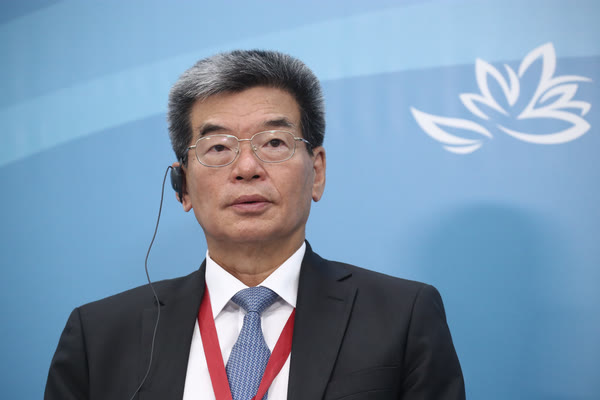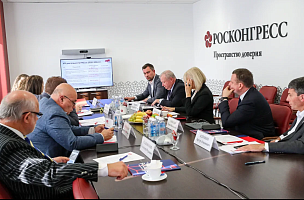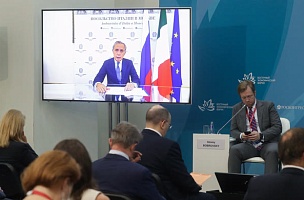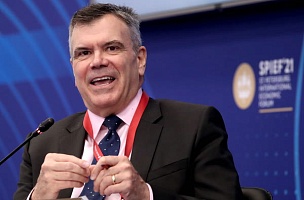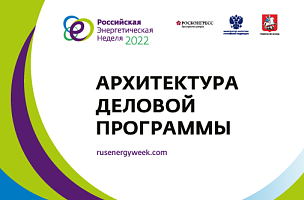KEY CONCLUSIONS
Russia and South Korea’s foreign trade turnover has been recovering rapidly in 2021
“We concluded the first six months of the year with some good results. Mutual foreign trade grew by almost 60%. It is very much our hope that if these growth rates continue, we will in all likelihood exceed pre-pandemic levels,” Sergey Katyrin, President, Chamber of Commerce and Industry of the Russian Federation.
“In 2020, trade and economic cooperation fell by more than 20% in the Far East, and virtually by the same amount across the country. This was a result of the crises caused by the pandemic. In 2021, bilateral trade has gradually stabilized and is now on a trajectory of growth. It is our hope that our joint efforts will result in this positive trend continuing,” Alexey Chekunkov, Minister of the Russian Federation for the Development of the Far East and the Arctic.
The potential exists for Russia and South Korea to cooperate across a broad range of areas, including industry, energy, and the environment
“We particularly want to highlight the cooperation that has taken shape in relation to smart city projects, industrial parks, and multimodal terminals for shipping in Primorye Territory. One of our assets is a joint venture with the Zvezda Shipbuilding Complex. We have also acquired a grain terminal and are developing this business in Primorye Territory. Collaboration between our two nations is increasing in energy, fishing, and other areas,” Christopher Koo, Chairman, Korea International Trade Association (KITA).
“South Korea has traversed a fairly long path in relation to the creation of a waste management system in the early 1990s. Since that time, the system has come to closely reflect our own targets in terms of waste disposal. At the start of this journey, virtually 80% of waste in South Korea went to landfill sites. Today, more than 60% is recycled. In Russia, the President has set the objective of processing – i.e., sorting – 100% of waste, and utilizing 50% of it by 2030. Naturally, we would be delighted to employ technological solutions in this area which have been implemented in South Korea,” Denis Butsayev, General Director, Russian Environmental Operator Public Law Company.
Limited opportunities offered by the railway infrastructure
“Our cooperation in the Far East is growing where the Trans-Siberian Railway begins,” Christopher Koo, Chairman, Korea International Trade Association (KITA).
“The Trans-Siberian Railway could serve as the basis for cooperation between our countries in the field of logistics. However, the situation around the Trans-Siberian Railway is fairly difficult,” Jinseop Kim, Senior Vice President, Unico Logistics Co Ltd.
“Russia’s leadership also has concerns regarding the opportunities offered by the Trans-Siberian Railway. It is indeed a problem, because it is a major factor hindering economic growth in Russia, both in terms of foreign trade, and in terms of domestic transportation. We expect carrying capacity to be expanded in the near future,” Sergey Katyrin, President, Chamber of Commerce and Industry of the Russian Federation.
“In this period of the COVID-19 pandemic, we are witnessing and experiencing rapid changes in the global economy, such as the digital economy, the low-carbon economy, and the restructuring of global supply chains. These changes are not temporary. It is expected that they will fundamentally reshape the paradigm of global development. In order to effectively react to these changes, it is vital that economic cooperation between Russia and South Korea reaches new heights,” Hong Nam Ki, Vice Prime Minister, Minister of Planning and Finance of the Republic of Korea.
“In terms of priority areas, we are willing to propose important sectors such as hydrogen power, medicine, and of course, tourism. Hydrogen power could become a key area of Russian-Korean collaboration, given the resources of the Far East and growing demand for imported hydrogen in the economies of the Asia-Pacific region,” Alexey Chekunkov, Minister of the Russian Federation for the Development of the Far East and the Arctic.
“2020 and the COVID-19 pandemic have had a substantial impact on all processes, including principles of work and priorities in international cooperation. Whereas previous editions of the Eastern Economic Forum saw us discussing collaboration with our South Korean partners in the traditional fields of automotive manufacturing, electronics, agriculture, and gas, today the agenda tends to focus more frequently on high-tech medicine, IT, biotechnology, the environment, and new materials,” Elena Kharisova, Vice President for Prospective Projects and New Infrastructure, Far Eastern Federal University (FEFU); General Director, Development Fund for the Russky Innovative Research and Technology Centre.
SOLUTIONS
Expanding cooperation in the Arctic
“We need to boost efforts to bring current projects to the implementation stage, and to expand the number of joint initiatives. That includes in the Arctic, where the largest incentive zone in the world – 5 million square kilometres – has been established,” Alexey Chekunkov, Minister of the Russian Federation for the Development of the Far East and the Arctic.
“We are aware of the interest South Korean companies have in large-scale projects to capitalize on the natural riches of the Russian Arctic. We are ready to discuss what form this work could take. Today I can only cite one example. A corporation is building a platform for Kamennomyskoye deposit, and we are employing the so-called concept of a distributed shipyard in practice. This enables Russian and South Korean shipbuilders to work together on common goals,” Alexey Rakhmanov, Chairman of the Board, Chief Executive Officer, United Shipbuilding Corporation.
Developing the transport and logistics infrastructure
“We would suggest that the Trans-Siberian Railway is developed in an ongoing, stable manner. Cargo is processed very slowly due to outdated equipment at ports. Modernization is required. The carrying capacity of the railways needs to be increased, and consideration should be given to the construction of additional railway lines. Consideration should also be given to the construction of a new hub at the Trans-Siberian border,” Jinseop Kim, Senior Vice President, Unico Logistics Co Ltd.
“Today there are many more options than before for transporting cargo from Japan, South Korea, and China to Europe. There is not just one route. We believe Russia has yet to fully realize its transit potential. Russia receives and conveys huge volumes of freight from South Korea, Japan, and China, not only for import – i.e., for domestic consumption – but also for transit to Europe,” German Maslov, Vice President of Liner and Logistic Division, FESCO.
For more information go to the Roscongress Foundation Information and Analytical System roscongress.org.


